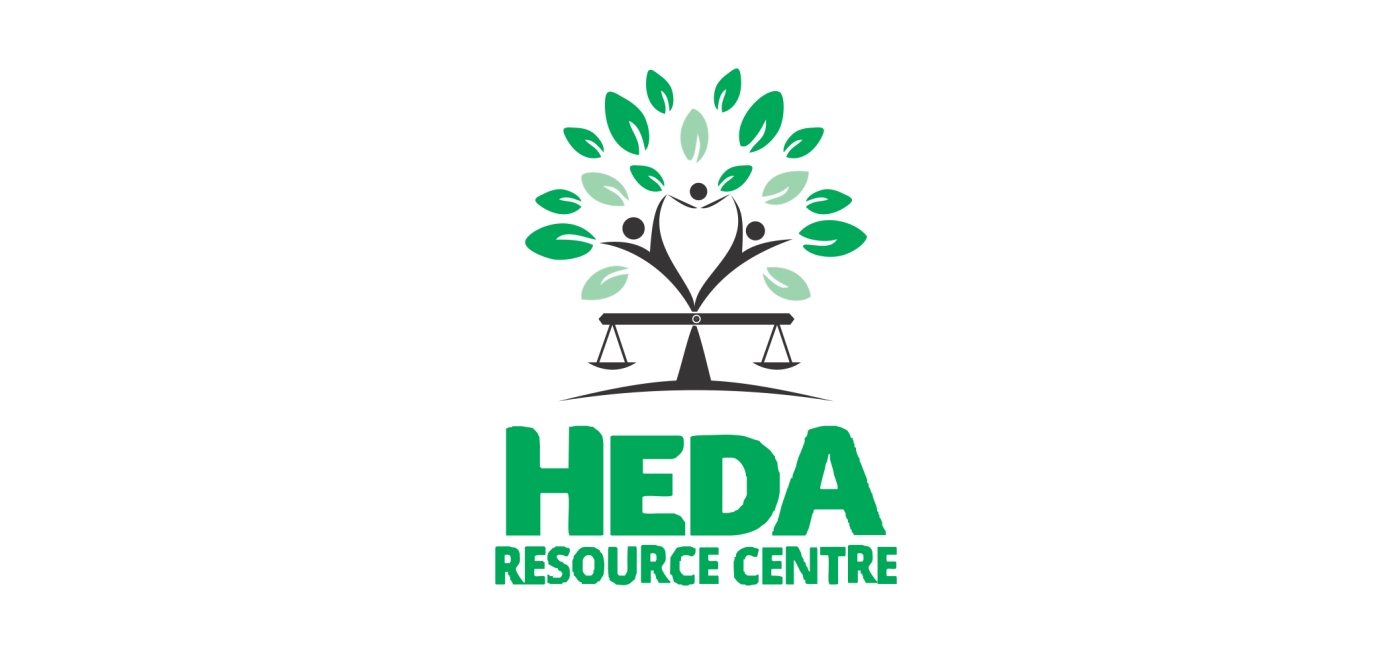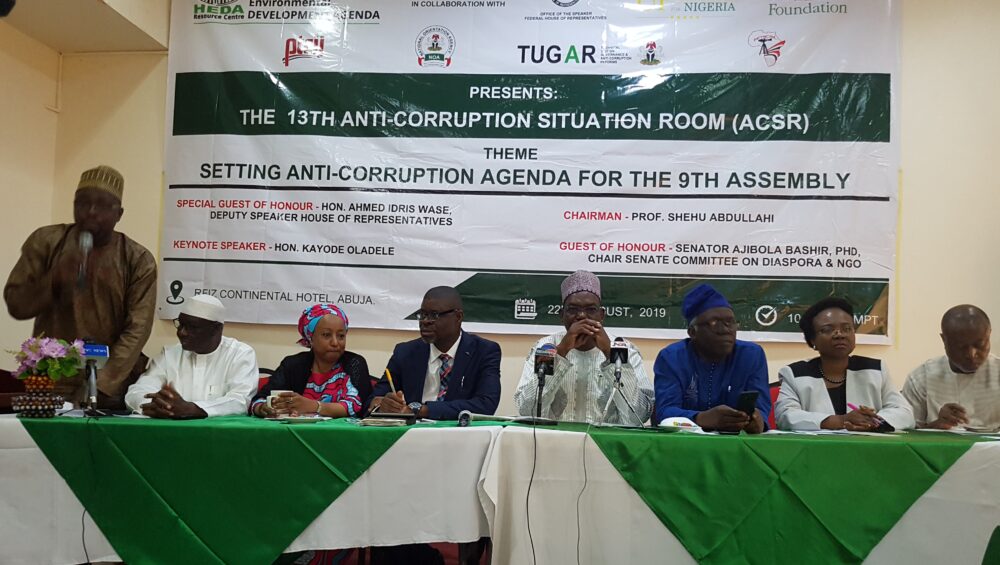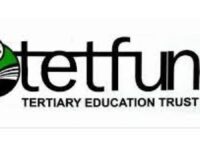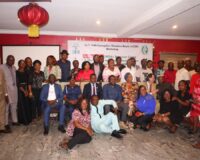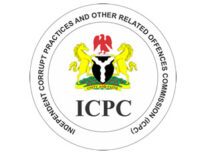Communique Issued at the End of the 13th Anti-Corruption Situation Room (ACSR) with the Theme: Setting Anti-Corruption Agenda for the 9th National Assembly Organized by Human Resource Development Agenda, (HEDA) with the support of the MacArthur Foundation and Actionaid-Nigeria, Held at Reiz Continental Hotel, Abuja On Thursday, August 22, 2019.
The historic event had in attendance, intellectuals and experts, drawn from professional bodies, labor, civil society and the media. Others were, Prof. Shehu Abdullahi, who chaired the event, Mariam Uwais (Special Adviser to the President on Social Investment), Dr. Otive Igbuzor (Chief of Staff to the Deputy Senate President), Dr Garba Abari (DG of National Orientation Agency (NOA)), Mr. Femi Falana SAN, Mr. Chido Onumah (Coordinator, AFRICMIL), Mr. Auwalu Musa Rafsanjani– represented by Mr. Jaclar Prusa (CISLAC), Prof. Sola Akinrinade (ICPC Academy), Mr. Dayo Olaide (Deputy Country Director, MacArthur Foundation), Dr. Aminu Guzau (EFCC’s Chairman Representative), Hon. Kayode Oladele, Dr. Bala Mohammed (Representative of ICPC’s Chairman), Ms. Ene Obi (Actionaid-Nigeria’s Country Director), Hadjia Saudatu Mahdi (WRAPA’s General– Secretary), Ms. Lilian Ekeanyanwu (Head- TUGAR), and other distinguished guests.
The keynote address was delivered by Honourable Kayode Oladele, immediate past Chairman of Nigeria’s 8th House of Representatives Committee on Financial Crimes.
Goodwill messages were delivered by representatives of various organisations, including Nigeria’s National Assembly, office of the Deputy Senate President, Special Adviser to the President on Social Investment, MacArthur Foundation, Actionaid-Nigeria and other civil society groups.
Background
Corruption remains a major obstacle to the economic, cultural and industrial renaissance in Nigeria. The (corruption) scourge has figuratively become a cancer that threatens to destroy the (entire) fabric of Nigeria’s political economy. Corruption is an issue of urgent national importance. It diminishes the instinct for innovation and creativity.
Corruption cannot be fought effectively, without a significant role of the National Assembly, which is the most profound, democratic representation of the aspirations of Nigerians.
In the midst of the momentum of the newly inaugurated 9th National Assembly, another unique window of opportunity has been opened for Nigerians, to constructively engage the National Assembly, given its role, as defined in Nigeria’s constitution, as amended, as an institution that is endowed (constitutionally) with statutory powers to confront corruption
Section 4(3) of the Nigerian constitution, empowers the National Assembly, to make laws, with respect to any matter for the peace and progress of the country. It is clear, therefore, that the National Assembly has the mandate to make laws that will tackle corruption wholly, as empowered by the constitution.
Participants express great delight in the Anti-corruption Situation Room (ACSR), through its programs of setting agenda for Nigeria’s National Assembly in the fight against corruption.
The National Assembly is a significant intervention platform and represents a potential institution that can create milestones in the campaign against corruption in Nigeria.
Corruption may not be easy to overcome or be eliminated. However, constant engagement of relevant stakeholders, offers a rainbow of opportunities for Nigerians to bring corruption to its barest minimum.
Participants recognized the past and present contributions of the National Assembly in the fight against corruption through enactments of laws, such as, the Corrupt Practices and other Related Offenses Act, 2000, Economic and Financial Crimes Commission,(Establishment Act, 2002), the Public Procurement Act, 2007, Nigerian Financial Intelligence Unit Act, which draws its powers from the Money Laundering (Prohibition) Act, 2011, the Nigerian Extractive Industries Transparency Initiative Act, 2007, the Fiscal Responsibility Act, 2007, and the Nigerian Financial Intelligence Unit Act, 2018, amongst, related Bills pending in Nigeria’s National Assembly.
Participants recognized, that the National Assembly, as part of its oversight functions, is also empowered to aid investigations of crime, control financial excesses of the tiers of government, expose corruption, waste or inefficiency, including, ensuring transparency in the disbursement of public funds.
The summit, however, observed that inspite of various anti-corruption laws, many loose ends persists, as corruption, continues to rear its head in every social, economic and political sphere of Nigeria.
For instance, participants observed, with regrets, that since 1999, no Auditor-General’s report has been reviewed conclusively by the National Assembly, creating a significant loophole in the country’s financial security system, amidst fears, that (some) suspects, linked to corruption have found themselves in the National Assembly as “lawmakers for Nigeria”.
Participants, also recognized limitations imposed, by either; executive interference on the National Assembly’s ability to engage issues of corruption, the meddlesomeness of the National Assembly’s leadership itself, in some veiled instances and suspicious attempts to protect corrupt public officials from the hands of the law, open conducts or declarations of National Assembly’s leadership, which fuels public suspicion and doubts about the National Assembly’s genuine commitment to fight graft.
Recognising that the National Assembly is critical in the campaign against corruption and that the free, unchallenged reign of corruption in Nigeria, is in itself, a threat to democracy, political stability and prosperity of the people.
After exhaustive debates, which involved panel discussions, experts session from various players, backed by rich and robust inputs from contributors, the participants, hereby, make the following resolutions:
- That the civil society are determined to assist in setting a new anti-corruption agenda for the 9th National Assembly, with the hope of setting up, vigorous pursuit of anti-corruption campaigns in ways, never witnessed for the peace and prosperity of Nigeria.
- Five critical areas, identified, as important to anti-corruption watchdog responsibilities of the National Assembly are: Budget Process; Constituency Projects of law makers; Effective Oversight Functions of the legislators; Prompt releases of the outcomes of National Assembly’s investigations on corruption (related) issues.; opacity surrounding the budget, Remuneration and Emoluments of National Assembly’s members and top Bureaucracy, which are of deep concern to Nigerians.
- That in this respect, the National Assembly, should promote public access to information on good governance at all tiers of government.
- That the National Assembly, should work with the civil society to promote effective and efficient enforcement of anti-corruption laws and also ensures, law enforcement agencies, do not work at cross purposes but collaborate and complement (each other) to effectively fight corruption.
- The domestication of all relevant international conventions on corruption and those concerning money laundering, financing of terrorism, sourcing of evidence abroad and the UN convention on corruption.
- That all pending bills relating to the fight against corruption in the National Assembly should be given expeditious passage by the law makers.
- The National Assembly and the civil society, should work together, to advance capacity and institutional building for anti-corruption agencies for optimum performance.
- Stakeholders and the National Assembly, should realised, that laws are necessary but not enough to fight corruption and therefore resolved to battle corruption by focusing on institutional reforms, especially, the transformation of Nigerian ethical standards.
- The civil society will work to promote greater quality, community sensitization and inclusive citizen engagement with the National Assembly.
- The civil society resolved to harmonise its programmes with the lawmakers and develop a strategic plan for constructive citizens- engagement.
- The National Assembly was also charged to take a critical position on how corruption affects women access to opportunities, which is not encouraging, looking at the number of women in the 9th National Assembly.
The Convener of the Anti-corruption Situation Room (ACSR) is mandated to liaise with the leadership of the 9th Assembly and undertake advocacy visits to their offices to present the report of the forum on agenda –setting and establish seamless communication with National Assembly’s leadership for implementation, monitoring and evaluation.
- Participants expressed gratitude to HEDA Resource Centre, MacArthur Foundation and Actionaid-Nigeria for the implementation of the Anti-Corruption Situation Room (ACSR), which has been recognized, as one of civil society’s strategic action platform in the collective battle to tackle corruption in Nigeria.
